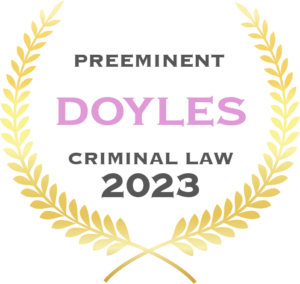In what is being called a landmark case, The Supreme Court of Victoria has ruled that people cannot be subjected to electro-convulsive therapy against their will.
What is electro-convulsive therapy?
Electro-convulsive therapy (ECT) is a procedure used to treat severe depressive, manic or psychotic symptoms. It involves passing an electric current through the brain until a brief generalised seizure occurs. A general anaesthetic and muscle relaxant are administered to the person before the procedure to ensure they do not feel anything and do not convulse during the treatment. The person usually wakes up between five and ten minutes after the treatment, usually without recollection of the ECT.
The case
Legal Aid Victoria appealed to The Supreme Court of Victoria on behalf of two of its clients seeking to clarify whether ECT can be administered without a patient’s consent. The clients are referred to as ‘PBU’ and ‘NJE’ to protect their identity.
PBU’s background
PBU had been diagnosed with schizophrenia in 2011 and had been admitted to hospital on a number of occasions.
In 2017, PBU’s psychiatrist made an application to The Victorian Civil and Administrative Tribunal (VCAT) to order PBU to undergo six ECTs. PBU underwent five of these procedures and his condition was said to improve dramatically. After the fifth treatment, PBU was reviewed by a psychiatrist who determined that PBU had the capacity to choose whether to continue with the treatment. PBU stated that he did not wish to proceed.
In March 2017 another application for PBU to undergo ECT was made. VCAT heard the matter in May 2017 where extensive medical evidence was given by PBU’s psychiatrist and the clinical director of the Mental Health Service for the Northern Area.
PBU wrote to VCAT stating that while he accepted that he had mental health problems he did not agree that he had schizophrenia. He outlined that he was willing to receive psychiatric and psychological treatment for depression, anxiety and post-traumatic stress disorder but he did not wish to have ECT.
VCAT had to make a determination under section 96(1)(a)(i) of the Mental Health Act (Vic) about whether PBU had the capacity to give informed consent and, if he did not have the capacity, whether there was a less restrictive way for him to be treated.
VCAT found that PBU did not have the capacity to give informed consent because he did not accept his diagnosis of schizophrenia. It then went on to determine that there were no less restrictive treatment options available.
NJE’s background
NJE also suffered from schizophrenia. She had been receiving treatment since 2004. NJE had been hospitalised for her condition on a number of occasions; some voluntarily and some involuntarily.
In March 2017 NJE was transferred to Bendigo Hospital where three applications for ECT were made by staff. The first two were rejected. One of the reasons for rejection was because the Mental Health Tribunal was not convinced that NJE lacked the capacity to give informed consent.
The third application was granted. NJE was ordered to undergo a course of 12 ECTs. NJE did not have a lawyer present during the hearing. NJE contacted Victoria Legal Aid the day after the hearing and applied to VCAT to have the matter reviewed.
While NJE strongly and consistently expressed that she did not wish to receive ECTs and would prefer to remain in hospital and continue to take medication, VCAT rejected her view and held that an ECT offered her the best hope of recovery.
Capacity to give consent
In Victoria, the capacity to give informed consent for ECT is contained in section 68 of the Mental Health Act 2014. Under the legislation, a person has the capacity to give informed consent if they:
· Understand the information that is relevant to the decision; and
· Are able to remember the information that is relevant to the decision; and
· Are able to use or weigh the information that is relevant to the decision; and
· Are able to communicate the decision they make by speech, gestures or any other means
In NSW the capacity to give consent to ECT is outlined in sections 91 and 92 of the Mental Health Act 2007. Section 91 outlines a number of steps that must be taken before consent is obtained. Consent must be “free, voluntary and written”. Section 92 outlines the circumstances under which a person is presumed incapable of giving informed consent.
Key Takeaways
- A landmark case in Victoria ruled against involuntary electro-convulsive therapy (ECT) for mental health patients.
- Legal Aid Victoria's appeal on behalf of clients PBU and NJE led to the Supreme Court decision, emphasizing patient consent and human rights.
- The case challenged the application of the Mental Health Act's capacity test and its alignment with human rights.
- Justice Kevin Bell's ruling underscored the importance of respecting patients' views and preferences in medical decisions.
The appeal
On appeal Supreme Court Justice Kevin Bell found that VCAT had misapplied the law. His Honour outlined that VCAT’s interpretation and application of the capacity test was incompatible with PBU and NJE’s human rights as outlined by the Charter of Human Rights and Responsibilities Act 2006 (Vic).
“Persons found to lack capacity do not lose their right to contribute to medical decisions about what should be done to them” Justice Bell outlined in his judgement. “As human rights apply universally to all people equally, a person with a mental disability has the same rights as other persons and, importantly for the present case, a person who lacks capacity has the same human rights as a person who does not lack capacity’”.
In summarising the matter, Justice Bell emphasised that “it is necessary to take the person’s views and preferences into account if it is reasonable to do so. This is a human rights safeguard.”
Hamilton Janke Lawyers has experience appearing in the Mental Health Review Tribunal. If you, or a loved one, needs advice or representation please contact Hamilton Janke Lawyers 24 hours a day, seven days a week on 4038 1666 (office hours) or 0422 050 502 (24/7).
Written By

James Janke
James Janke is founding partner at Hamilton Janke Lawyers, and has more then decade of experience as a Criminal Defence Lawyer. Admitted to both the Supreme Court of New South Wales and High Court of Australia



